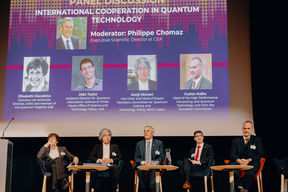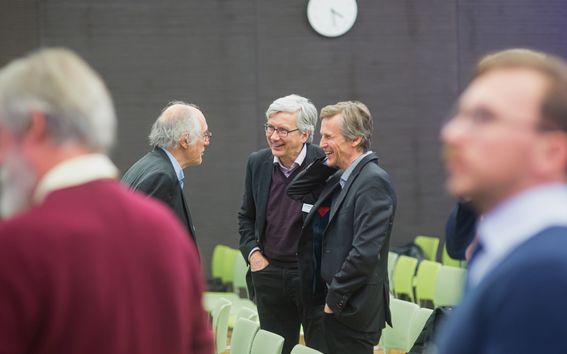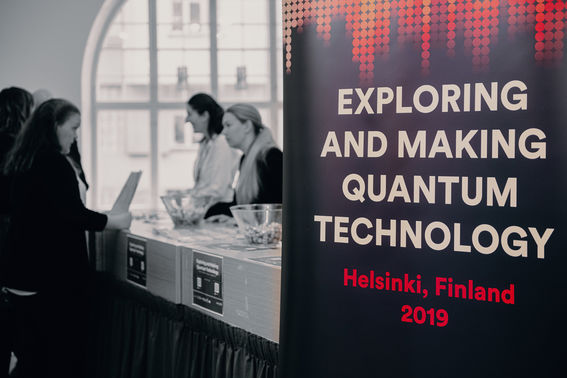Helsinki becomes the epicentre of the European Quantum Flagship event

On October 17-18th, Helsinki hosted the Finnish Presidency – Quantum Flagship “Exploring and Making Quantum Technology” event, which gathered over 250 quantum experts from all over Europe to discuss the current landscape of the quantum technologies’ ecosystem in Europe.
The two-day event became the perfect place for the scientific community to come together with industry representatives and policymakers to view the current status and progress of quantum technologies within Europe, and define the next steps and strategic goals for the advancement of these technologies in the region. The event was organised by the Finnish Presidency, Aalto University, VTT Technical Research Centre of Finland, the Academy of Finland, the Quantum Flagship, and supported by the European Commission,
The participants filled the conference room the first day to hear about various of the accomplishments attained so far in the field by the European quantum community as well as to learn about the initiatives in the field at a Finnish level. They also had the chance to have insights on the strategic approach that the European Commission is planning to put into motion in the Quantum Technology field in the period 2021-2027. This is articulated around 4 major pillars of activity, addressing: research and technology development in the Quantum Flagship priority areas, large-scale infrastructure investments in quantum communications and computing, building a competitive quantum industry and skilled workforce, and international cooperation.

As the closing session of the day, a panel discussion took place on policy issues and infrastructures concerning the future roll out of quantum technologies both in the European Union and in the different Member States with representations from Austria, Finland, France, Germany, Slovakia, and the Netherlands:
- Khalil Rouhana - Deputy Director General, DG Connect (European Commission)
- Michael Wiesmüller - Head of Department / Key Enabling Technologies for Industrial Innovation, Austrian Federal Ministry of Transport, Innovation and Technology (BMVIT) (Austria)
- Paul Indelicato - Senior Researcher at CNRS and Research Advisor of the Conference of the University President (France)
- Antti Vasara President & CEO, Technical Research Centre of Finland (VTT) (Finland)
- Herbert Zeisel - Deputy Director General “Research for Digital Transformation and Innovation”, Federal Ministry of Education and Research (BMBF) (Germany)
- Ambassador Milos Koterec - Innovation Counsellor at the Slovakia embassy in Helsinki (Slovakia)
- Rogier Verberk - Chair of the Quantum Flagship Innovation Working Group and Director Semiconductor Equipment at TNO (The Netherlands)
The panellists gave their opinions on the development of quantum technologies within the region and emphasized the importance of joining forces to create one strong European ecosystem that would make a difference and allow the region to compete at an international level.
The second day focused on a more scientific agenda, bringing to the stage different European and international experts, who together with the audience debated and discussed on the current status of areas such as international cooperation, infrastructures, engineering, intellectual property and education. They also brought to discussion proposed future commitments, initiatives, as well as challenges that need to be overcome in order to boost the development of these technologies to start transferring them to the market in the near future.
One of the highlights of this second day was the panel discussion on International Cooperation with representatives from Europe, United States and Japan. The panel members talked about the progress that is being carried out and achieved in each of these regions within quantum technologies and addressed different issues, such as the sharing of infrastructures, creating international innovation hubs in each area that can attract foreign talent and investments, as well as foreseeing future collaborations for the joint development of fabrication processes, training and education opportunities at an international level to broaden expertise. Panel members included the following renowned speakers:
- Elisabeth Giacobino (Research Emerite at CNRS and member of the Quantum Flagship Strategic Advisory Board- SAB)
- Jake Taylor (Assistant Director for Quantum Information Science at the White House Office of Science and Technology Policy, USA; and Interim Director, National Quantum Coordination Office, USA),
- Kenji Ohmori (Vice Chair and Head of Expert Members, Committee for Quantum Science and Technology Policy, Ministry of Education, Culture, Sports, Science and Technology (MEXT) of Japan; Professor and Chairman, Institute for Molecular Science, National Institutes of Natural Sciences, Japan),
- Gustav Kalbe (Head of the High Performance Computing and Quantum Technology unit from the European Commission).
Pascal Maillot, Deputy Head of the Unit High Performance Computing & Quantum Technology from the European Commission, gave the closing remarks of the “Exploring and Making Quantum Technology” event, emphasizing the importance of the creation of the Quantum Flagship and stating that quantum is a high priority for the new to-be established Commission.

Link to the Picture Album of the event
About the Quantum Flagship
The Quantum Flagship was launched in 2018 as one of the largest and most ambitious research initiatives of the European Union. With a budget of at least €1 billion and a duration of 10 years, the flagship brings together research institutions, academia, industry, enterprises, and policy makers, in a joint and collaborative initiative on an unprecedented scale. The main objective of the flagship is to consolidate and expand European scientific leadership and excellence in this research area as well as to transfer quantum physics research from the lab to the market by means of commercial applications and disruptive technologies. With over 5000 researchers from academia and industry involved in this initiative throughout its lifetime, it aims to create the next generation of disruptive technologies that will impact Europe’s society, placing the region as a worldwide knowledge-based industry and technological leader in this field.
www: https://qt.eu/
Twitter: @QuantumFlagship
Read more news

Significant donation to boost pavement engineering research and education
Companies and associations in the field have donated €400,000 to the School of Engineering.
Design strengthens industrial competitiveness – human-centered factory work at the core
Factory work is undergoing a transformation: new technologies and artificial intelligence are changing the content and roles of work. Aalto University’s Department of Design is studying this change from a human-centered perspective in the HiFive project.
Learning to slow down: cold-water swimming benefits explored in new study
Swimming in cold water offers a temporal slowdown, promoting stress management and mental clarity that lingers long after the experience, says research from Finland.






